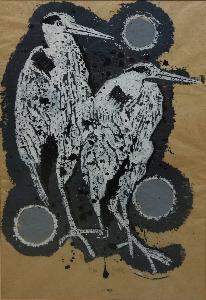Karl Zerbe
Karl Zerbe
Place: Berlin
Born: 1903
Death: 1972
Biography:
Karl Zerbe (September 16, 1903 – November 24, 1972) was a German-born American painter and educator. Zerbe was born in Berlin, Germany and studied at the Technische Hochschule in Friedberg, Germany. From 1921 until 1923 he lived in Munich, where he studied painting at the Debschitz School, mainly under Josef Eberz. From 1924 until 1926 Zerbe worked and traveled in Italy on a fellowship from the City of Munich. In 1932 his oil painting titled, ‘’Herbstgarten’’ (autumnal garden), of 1929, was acquired by the National-Galerie, Berlin; in 1937, the painting was destroyed by the Nazis as 'Degenerate art.' From 1937 until 1955, Zerbe was the head of the Department of Painting, School of the Museum of Fine Arts, Boston. In 1939 Zerbe became a U.S. citizen and the same year for the first time he used encaustic. He joined the faculty in the Department of Art and Art History at Florida State University in 1955, where he taught until his death. He was grouped together with the Boston artists Kahlil Gibran (sculptor), Jack Levine and Hyman Bloom as a key member of the Boston Expressionist school of painting, and through his teaching influenced a generation of painters, including, among others, David Aronson, Bernard Chaet, Reed Kay, Arthur Polonsky, Jack Kramer, Barbara Swan, Andrew Kooistra, and Lois Tarlow. His works are thought significant because they record 'the response of a distinguished artist of basically European sensibility to the physical and cultural scene of the New World'.

